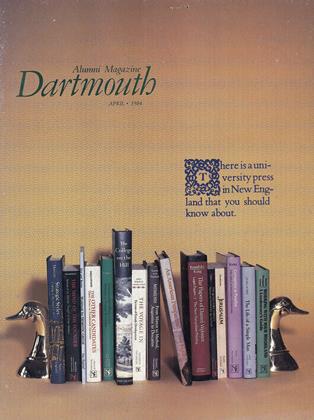The computer system at Dartmouth is very democratic, and the College's new director of computing services thinks that's just fine. A "democratic" computer system, is not one with a donkey on its bumper sticker, though, but one which encourages and makes possible broad use of its capabilities within the humanities and social sciences as well as within the physical sciences.
Raymond K. Neff '64, recently promoted to director of computing services from the post of director of academic computing, is a case in point himself. In addition to his administrative duties, he has continued to do computing research in two divergent areas biomedical sciences and medieval literature. A mathematics major as an undergraduate in Hanover (when he worked with Professors Kemeny and Kurtz, authors of BASIC and pioneers of time-share computing), Neff went on to earn S.M. and Sc.D. degrees in biostatistics from Harvard. He returned in 1982 to Dartmouth, where he also holds adjunct associate professorships in community and family medicine and in mathematics and computer science. In his new administrative post, Neff succeeds William Y. Arms, who was appointed vice provost for computing and planniing.
Neff's interest in finding effective uses for the computer in biomedical science has found many outlets. One of his more extensive research projects is in the area of child health. He is working with an obstetrician in Boston on computerizing information on some 60,000 births, to try and relate incidents in maternal labor to the health of the child through age. seven. With the computer to organize and analyze 10,000 bits of information on each child, he hopes to discover correlations which may exist between such occurrences as an infant's brain being squeezed during labor and the child's later health. Neff has also undertaken other research projects in the medical field on such topics as cancer and hypertension.
But he hasn't restricted his scope to the scientific. He is also working on something called the Dartmouth Dante Project. Begun in collaboration with former Montgomery Fellow and Visiting Professor Robert Hollander from Princeton, the Dante Project proposes to computerize about 80 scholarly commentaries on Dante's Divine Comedy. The premise of the project is that scholars would benefit greatly by being able to simultaneously view all references to a particular passage or topic in the Divine Comedy, while at the same time composing on the screen.
Neff firmly believes that Dartmouth deserves its reputation as a leader in academic computing. He feels this is largely due to "a long history of strong support for academic computing on the part of the college administration." The further "democratization" of the Dartmouth computer network, with the recently-announced proposal to equip students with personal computers, is something he views with enthusiasm. With the right tools, he says he thinks undergraduates can do imaginative work in computing research.
Raymond Neff '64, director of computingservices for Dartmouth, had the honor of unpacking one of the first of the College's newMacintosh computers the model that willbe provided to incoming freshmen for theirpersonal use beginning this fall.
 View Full Issue
View Full Issue
More From This Issue
-
 Cover Story
Cover StoryConsortium
April 1984 By Shelby Grantham -
 Feature
FeatureHanover Sabbatical
April 1984 By Robert Conn '61 -
 Feature
FeatureCenters of Excellence and the Survival of Creativity
April 1984 By O. Ross Mclntyre '53 -
 Feature
FeatureRobert Frost Keeps Me Company Often Uninvited
April 1984 By Kenneth Andler '26 -
 Article
ArticleIt's Just Like Talking to People
April 1984 By Debbie Schupack '84 -
 Class Notes
Class Notes1959
April 1984 By William G. Long
Article
-
 Article
Article77 Out of 595 Freshmen Are Sons of Alumni
November 1942 -
 Article
ArticleHopkins Center Marks Its 10th Anniversary
NOVEMBER 1972 -
 Article
ArticleROTC Does Not Belong At Dartmouth
NOVEMBER 1991 -
 Article
ArticleBig Green Teams
NOVEMBER 1971 By JACK DEGANGH -
 Article
ArticleExploring a Fourth-Dimensional World
MARCH 1973 By JOSHUA D. WARACH '76 -
 Article
ArticleSpencer Norton '28: A marrying Old Soul is He
APRIL 1984 By Steve Farnsworth' 83

